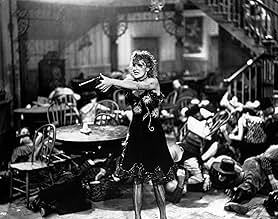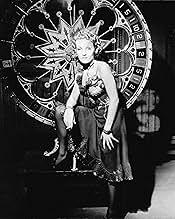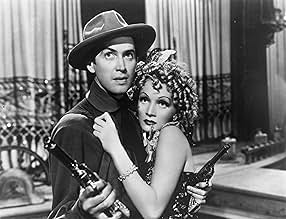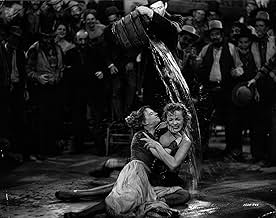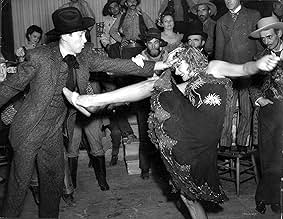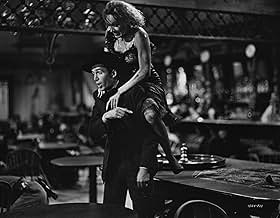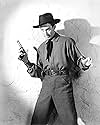CALIFICACIÓN DE IMDb
7.6/10
13 k
TU CALIFICACIÓN
El ayudante del sheriff Destry controla el pueblo de Bottleneck, incluyendo a la cantante del saloon, Frenchy.El ayudante del sheriff Destry controla el pueblo de Bottleneck, incluyendo a la cantante del saloon, Frenchy.El ayudante del sheriff Destry controla el pueblo de Bottleneck, incluyendo a la cantante del saloon, Frenchy.
- Dirección
- Guionistas
- Elenco
- Premios
- 5 premios ganados en total
Opiniones destacadas
It is true that there are parody elements in George Marshall's delightful "Destry Rides Again" but the real humor lies not so much in these sorts of antics, nor the heavily laid on inquiries of Marlene Dietrich as to the tastes of the backroom boys, but rather in James Stewart's no-gun Destry characterization
This springs from the same source as Ford's 'characters', recognizable frontier independent-minded eccentrics, with a firm footing in American literature; characters often with a roundabout way of making a point, or pointing a moral, as with Destry's habit of prefacing each little cautionary parable with: 'I knew a fellow once who ' A habit that inevitably drew the aggrieved riposte: 'You know too many fellows, Destry '
The other 'characters' in this film have more than a color or two of parodyMischa Auer's improbable Slavonic cowboy, Charles Winninger's town drunk, Brian Donlevy, unprincipled boss, and Samuel S. Hinds' nicely played judge
In retrospect, it's odd how much this movie gains from its rather touching little postscript Stewart, the unconventional lawman, having pacified his cowtown, strolls the streets with a hero-worshiping lad at his heels, and yet also takes a little cloud of sadness along with him
Marshall's film is considered a classic Western which manages to encompass suspense, comedy, romance, tenderness, vivid characterization, horseplay, songs and standard western excitements, without moving for more than a moment from a studio main street set Hollywood expertise at its very best...
This springs from the same source as Ford's 'characters', recognizable frontier independent-minded eccentrics, with a firm footing in American literature; characters often with a roundabout way of making a point, or pointing a moral, as with Destry's habit of prefacing each little cautionary parable with: 'I knew a fellow once who ' A habit that inevitably drew the aggrieved riposte: 'You know too many fellows, Destry '
The other 'characters' in this film have more than a color or two of parodyMischa Auer's improbable Slavonic cowboy, Charles Winninger's town drunk, Brian Donlevy, unprincipled boss, and Samuel S. Hinds' nicely played judge
In retrospect, it's odd how much this movie gains from its rather touching little postscript Stewart, the unconventional lawman, having pacified his cowtown, strolls the streets with a hero-worshiping lad at his heels, and yet also takes a little cloud of sadness along with him
Marshall's film is considered a classic Western which manages to encompass suspense, comedy, romance, tenderness, vivid characterization, horseplay, songs and standard western excitements, without moving for more than a moment from a studio main street set Hollywood expertise at its very best...
Destry Rides Again (1939)
A brilliantly made spoof of the early American Western. This came out at a strange time for this kind of reflective comedy, because in fact the Western was just this year having a revival with three serious Westerns including John Ford's legendary Stagecoach. But the fixtures of this kind of movie were well in place--the barroom brawl, the bad men and their guns, the good sheriff coming to the rescue, the sweet untainted woman and the quasi-whorehouse type woman, and of course the final shootout. It's all here. And it's a wild ride done with subtlety, a difficult combination to pull off.
It's fun to see this movie and then compare to the later generation of take-offs and spoofs that take themselves much more seriously--the spaghetti Westerns of the 1960s. These, too, used all the clichés of the Western to make an amusing reference to those types. The reason why those movies worked so well, and why Destry does, too, is that these are attractive archetypes. We see ourselves in these people, somehow, and yet not too closely. We identify with them (especially Jimmy Stewart the sheriff and Marlene Dietrich the bad woman with a good heart who can sing, too) and yet know they are all artifice, just as in a play. The illusion of reality is damped down by the excess and the fun, and the obvious exaggerations.
As for director George Marshall, he's a hardened Hollywood veteran most famous, perhaps, for a long string of golf movies (yes golf, the sport). But his expertise, and his willingness to go for broke with scenes involving dozens or even hundreds of people, and to use the camera vigorously, and to realize he had two of the greatest actors he could ask for (Stewart toward the beginning of his career, and Dietrich still a great star though cast against her normal romanticized type from the early 1930s) is phenomenal. You'll shake your head and laugh at the same time.
In fact, it is the chemistry of the two stars that gives the movie surprising depth. It's not just a farce. It talks about pacifism just as World War II is brewing. And it suggests something about true love as much as carnal attraction. All while the world is exploding around the two leads, almost literally, as you'll see. And whatever might happen on screen by the end, it's fun to know that the two had a real affair offscreen, with some hush hush scandal to follow years later.
Watch this and laugh and maybe even cry a little. Great stuff.
A brilliantly made spoof of the early American Western. This came out at a strange time for this kind of reflective comedy, because in fact the Western was just this year having a revival with three serious Westerns including John Ford's legendary Stagecoach. But the fixtures of this kind of movie were well in place--the barroom brawl, the bad men and their guns, the good sheriff coming to the rescue, the sweet untainted woman and the quasi-whorehouse type woman, and of course the final shootout. It's all here. And it's a wild ride done with subtlety, a difficult combination to pull off.
It's fun to see this movie and then compare to the later generation of take-offs and spoofs that take themselves much more seriously--the spaghetti Westerns of the 1960s. These, too, used all the clichés of the Western to make an amusing reference to those types. The reason why those movies worked so well, and why Destry does, too, is that these are attractive archetypes. We see ourselves in these people, somehow, and yet not too closely. We identify with them (especially Jimmy Stewart the sheriff and Marlene Dietrich the bad woman with a good heart who can sing, too) and yet know they are all artifice, just as in a play. The illusion of reality is damped down by the excess and the fun, and the obvious exaggerations.
As for director George Marshall, he's a hardened Hollywood veteran most famous, perhaps, for a long string of golf movies (yes golf, the sport). But his expertise, and his willingness to go for broke with scenes involving dozens or even hundreds of people, and to use the camera vigorously, and to realize he had two of the greatest actors he could ask for (Stewart toward the beginning of his career, and Dietrich still a great star though cast against her normal romanticized type from the early 1930s) is phenomenal. You'll shake your head and laugh at the same time.
In fact, it is the chemistry of the two stars that gives the movie surprising depth. It's not just a farce. It talks about pacifism just as World War II is brewing. And it suggests something about true love as much as carnal attraction. All while the world is exploding around the two leads, almost literally, as you'll see. And whatever might happen on screen by the end, it's fun to know that the two had a real affair offscreen, with some hush hush scandal to follow years later.
Watch this and laugh and maybe even cry a little. Great stuff.
This was the first great Western pastiche - reviving the genre (with Stagecoach) to A-movie status. How many classic Western adventures have real comedy, poignant love scenes and great songs, plus Marlene Dietrich and James Stewart in the leads? All the character (stereo)types are convincing - villains, cowboys, ordinary townsfolk and the Dietrich/Frenchie-Stewart/Destry relationship adds depth. Easily on a par with Stewart's other 39/40 greats (Mr Smith, Philadelphia Story). Entertaining bar-room brawl scenes. Even the score is wonderful! Very highly recommended.
Jimmy Stewart, in the title role, is a pleasure to watch and listen to. The economy he brings to the role is surpassed only by his drollness. Marlene Dietrich is magical and when she and Stewart get together, it may not be exactly sparks but there sure is some heat.
This is one of the finer westerns of the period. It holds up very well into the 90s. The supporting characters are well cast and bring a nice feel of variety to the tiny town of Bottlenck.
This is one of the finer westerns of the period. It holds up very well into the 90s. The supporting characters are well cast and bring a nice feel of variety to the tiny town of Bottlenck.
This movies had three strikes against it at Oscar time. 1)It was made in 1939 arguably the single year when more great films came out than any other year, 2) It was a western(no western had won best picture since "Cimaron" and would not again until "Dances With Wolves"and 3) It was a comedy and movie fans know how well comedy movies do at Oscar time. I know people who simply will not watch a black and white film or an old movie. Well, in my opinion, this movie has a story that is thoroughly enjoyable and stands up well even today. It has an excellent cast not only in the lead roles but also in the supporting cast. So, anyone who might not watch this film because it is not color is cheating themselves of an enjoyable film. And for any who just don't watch a film just because it is old, may I suggest that if you haven't seen a movie it is new for you. As for myself, I just did not endorse this film, but I put my money where my mouth is and forked over the greenbacks not once but twice. I got the film on VHS, and enjoyed it thoroughly. Upon finding it newly released on DVD, I got it again. The picture quality in the DVD is great. I'm a little surprised that there were no special feature extras included since these kind of bonuses are so common with DVD releases. But I suppose that would be like criticising a painting because of a lack of a fancy frame. This film certainly deserved to sweep the Oscars, and probably would have in a different year. 'Nuff sed.
¿Sabías que…?
- TriviaAccording to her grandson Peter Riva, who was interviewed for the Icons Radio Hour, Marlene Dietrich's fight scene was unchoreographed. She and Una Merkel agreed to do it impromptu with the only rule being no closed fists. They used feet, pulled hair, and Marlene had bruises for weeks afterwards, but the director got everything in one take.
- ErroresTom Destry (James Stewart) makes the typical movie actor mistake of shooting his pistol at something by jerking the pistol and firing the gun at the target at the same time. In reality, if a shooter did that he would be moving the pistol off line and would miss every time, because the motion of the hand would impart a vector onto the bullet that would make it miss. Also, shooting that way is incredibly inaccurate. A real shooter would level the pistol at the target and then pull the trigger. Audie Murphy, a trained marksman, shot his pistols correctly in the remake Honor y venganza (1954).
- Citas
Tom Destry Jr.: Oh, I think I'll stick around. Y'know, I had a friend once used to collect postage stamps. He always said the one good thing about a postage stamp: it always sticks to one thing 'til it gets there, y'know? I'm sorta like that too.
- ConexionesFeatured in AFI Life Achievement Award: A Tribute to James Stewart (1980)
- Bandas sonorasSee What the Boys in the Back Room Will Have
(1939) (uncredited)
Lyrics by Frank Loesser
Music by Friedrich Hollaender
Sung by Marlene Dietrich
Selecciones populares
Inicia sesión para calificar y agrega a la lista de videos para obtener recomendaciones personalizadas
- How long is Destry Rides Again?Con tecnología de Alexa
Detalles
Taquilla
- Total en EE. UU. y Canadá
- USD 345,000
- Tiempo de ejecución
- 1h 35min(95 min)
- Color
- Relación de aspecto
- 1.37 : 1
Contribuir a esta página
Sugiere una edición o agrega el contenido que falta


